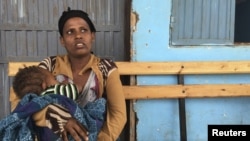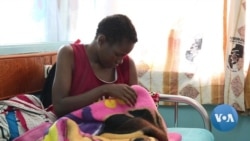Medical experts in Kenya are banking on human breast milk to save the lives of newborn babies.
Nairobi's Pumwani Maternity Hospital has set up East Africa's first breast milk bank the second in Africa — to provide donated milk to babies in need.
At the hospital it is feeding time as Mary Auma holds onto a bottle with one hand as the other supports her baby, who was born one month early.
Auma has been sick so she cannot breastfeed as recommended by the World Health Organization and would have been forced to use less healthy formula milk.
A first for region
In March, Nairobi's Pumwani Maternity Hospital opened the region's first human milk bank.
Auma said the milk bank has helped her because when she became ill, making her unable to nurse the child, the baby was given milk from the bank.
Kenya's Ministry of Health and PATH, a U.S.-based nonprofit health organization, launched the milk bank plan in March with the hope of reducing the number of newborn deaths which are currently at 39 per every 1,000 live births.
The milk bank is for premature babies, those born with low birth weight and those whose mothers may not be able to breastfeed them.
While only 58 babies have benefitted from the milk bank so far, hospital staff said more mothers are leaving with healthy newborns.
Mortality rate drops
"Though the project is still very young we have noted that the neonatal mortality rate is going down drastically,.” said Keziah Njau, the head nurse at the hospital.
The breast milk bank is the first in East Africa and the second opened on the continent after South Africa.
The WHO says premature babies have a higher chance of survival if fed breast milk instead of formula.
Dr. Elizabeth Kimani-Murage, the senior research scientist at Nairobi's African Population and Health Research Center, led the push for the Nairobi milk bank.
"Research where human milk banking has been implemented has shown that neonates like pre-term babies and low birth weight babies or sick children, when they are given human donor milk instead of formula, they survive better,” Kimani-Murage said.
Donor happy to help
Donors are sourced among mothers within the hospital. Mary Ndinda, one of the donors, said she is happy to save lives.
She said she opted to donate to women who do not have milk or to babies who do not have mothers because her breasts were engorged and very painful just days after she gave birth.
Kenyan authorities plan to set up other milk banks across the country, if the one in Nairobi proves a success.






